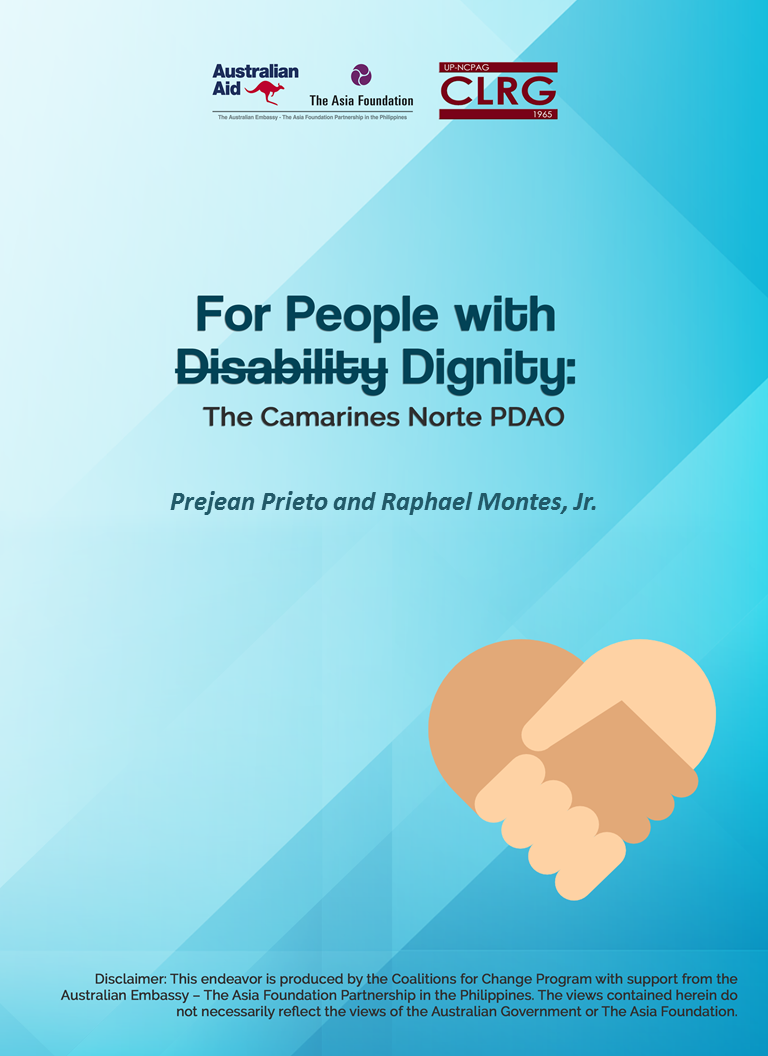|
ASIAN RESOURCE CENTER FOR DECENTRALIZATION
Data Atlas Infographics Policy Briefs and Reviews Recommended Online Library Ask ARCD |
Enabling the DisabledFor People with (Disability) Dignity: The Camarines Norte PDAO
Prejean Prieto & Raphael Montes, Jr.
|
- Home
- Who We Are
- In House Experts
-
Programs
- Executive Education >
- Local Legislative Program >
- Customized Training >
- Specialized Courses
- Professional Development Program
- Youth in Local Governance Program >
-
Webinars
>
- Ugnayan Webinar Series
- Rising to the Challenge Series
- Policy Issues Forum
- Youth and Risky Behaviors
- Combating an Invisible Enemy Live
- Rebooting the Local Economy Live
- LGU Management of Pandemic Live
- Effective Risk Communication Live
- Women Children and Crisis Live
- SKDM4 Livestream
- Preparing and Financing LGU COVID19 Recovery Plans Livestrea
- Program Calendar
- 2024 Course Registration
-
Research
- Ongoing Research Projects
-
Publications
>
- Local Matters Book of Readings >
- LG Book of Readings IV
- The Future of Local Autonomy
- Devolved Agricultural Extension Services in the Philippines
- Decentralization and Good Urban Governance
- Innovations and Excellence
- Book of Readings 1
- Book of Readings 2
- Book of Readings 3
- Handbook of Local Fiscal Administration in the Philippines
- Handbook of Modern Management in Philippine Local Government
- Federalism and Multiculturalism
- Decentralization and Power Shift Vol I
- Decentralization and Power Shift Vol II
- Fifteen Years of Decentralization in the Philippines
- Decentralization, Autonomy and the Local Government Code
- Good Urban Governance in the Philippines: Status and Best Practices
- Developing Community Capacities for Pro-Poor Budgeting and Local Government Accountability for Poverty Reduction Book
- Policy Briefs and Reviews >
- Consulting
- Partners
-
Latest CLRG News
-
Local Government Stories
>
-
LocalGov Stories
>
-
LG Stories Archives
>
- July 2016 Stories
- April 2016 Stories
- March 2016 Stories
- February 2016 Stories
- January 2016 Stories
- December 2015 Stories
- January 2015 Stories
- May 2014 Stories
- April 2014 Stories
- March 2014 Stories
- February 2014 Stories
- January 2014 Stories
- May 2013 Stories
- June 2013 Stories
- July 2013 Stories
- August 2013 Stories
-
LG Stories Archives
>
-
LocalGov Stories
>
-
Local Government Stories
>
- Citizen's Charter


